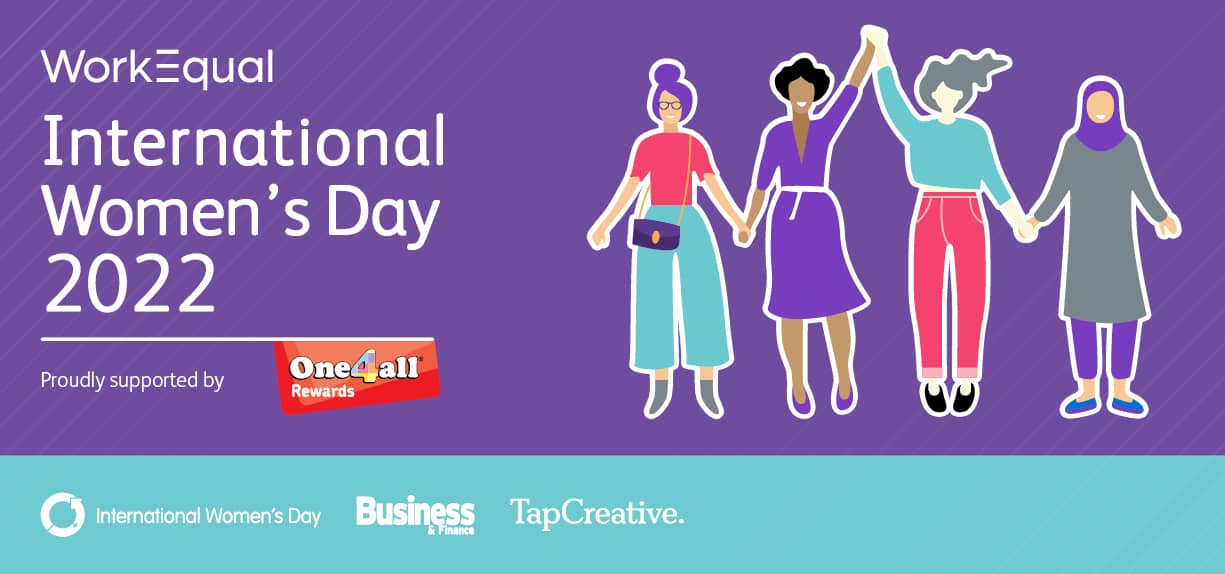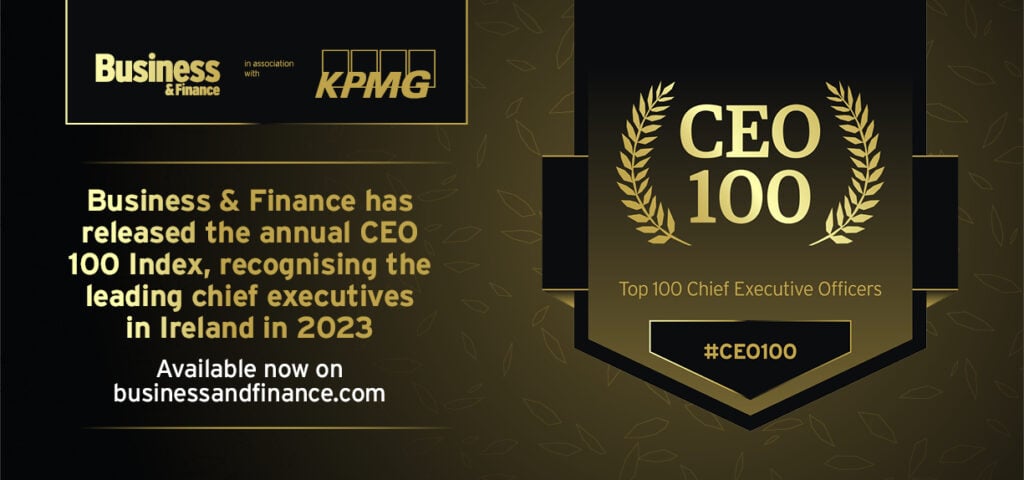To celebrate International Women’s Day, Irish charity WorkEqual hosted a diverse line-up of speakers for an online event, ‘Examining Bias – Perspectives on Progress’, yesterday, Tuesday, 8th March.
To celebrate International Women’s Day, Irish charity WorkEqual hosted a diverse line-up of speakers for an online event, ‘Examining Bias – Perspectives on Progress’, on Tuesday, 8th March.
The speakers ranged from CEOs, founders and broadcasters to secondary school students and activists.
The event, which was produced in partnership with Business & Finance and sponsored by One4all, was hosted by broadcaster, entrepreneur and founder of WorkEqual, Sonya Lennon.
The webinar is available to stream on demand below, or at this link.
Speakers who shared their thoughts on, experiences of and solutions to gender bias included:
- Ola Majekodunmi, broadcaster, co-founder of Beyond Representation and board member of Foras na Gaeilge;
- Senator Eileen Flynn, the first member of the Traveller community to serve in the Oireachtas;
- Emer Neville, President of the Irish Second-Level Students’ Union;
- Moira Aston, CEO of Canoeing Ireland and board member of the Olympic Federation of Ireland;
- Lewize Crothers-McCauley, CEO and founder of the Irish Edtech platform Exit Entry;
- Catherine Guy, CEO of NiftiBusiness, Non-Executive Director of the Football Association of Ireland and Children’s Health Ireland;
- David Monaghan, Deputy Editor, Business & Finance
The event opened with a special contribution from Angela Smith, CEO of WorkEqual, who said: “At WorkEqual, we are at the forefront of helping women back into the workplace and helping them progress by removing or reducing barriers.” Ms. Smith noted that WorkEqual has supported over 4000 women in the last 10 years, and that 5 out of every 10 got work. and Jock Jordan, Country Vice President of One4all later addressed attendees, noting that International Women’s Day is a cause close to the company’s heart. He said: “Our core focus is employee recognition and well-being, and equality in the workplace is a huge part of that.”
Sonya Lennon then started proceedings in a welcome address, before moderating the event’s two panels. Takeaways from both are available below.
Examining Bias: Perspectives on Power, Influence, and Powering Change
Lewize Crothers-McCauley, CEO and founder of the Irish Edtech platform Exit Entry, spoke about her experiences of bias in the first panel discussion, entitled ‘Examining Bias: Perspectives on Power, Influence, and Powering Change.‘ She said: “My whole life I have experienced bias, whether that was in school, working for other people … It has followed me from the age of 5, when I wanted to play football and I couldn’t, right through to when I’ve had comments about my investment opportunities because of the tattoos that I have … We need to look upstream and start educating our youth about how they can achieve anything they want to at a very early age.”
Moira Aston, CEO of Canoeing Ireland and board member of the Olympic Federation of Ireland, added: “Because I am of a different generation to people who are starting out now, I cam through at a time when there was no acknowledgement of any bias there … You would kind of be the other if you thought you deserved more … It was accepted that women would stay at home and look after the children, it was just accepted … If we keep questioning and challenging, then things will continue to improve as they go along.”
Catherine Guy, CEO of NiftiBusiness, Non-Executive Director of the Football Association of Ireland and Children’s Health Ireland, spoke about the change she has witnessed in the last few decades: “There have been a lot more women coming into the profession,” she said. Ms. Guy then noted that there is still work to do, noting a lack of senior female leadership across the legal sector, professional services, the banking sector, and more.
Examining Bias: Next Gen Perspectives
Emer Neville, President of the Irish Second-Level Students’ Union, spoke about her experiences of being a woman in leadership in the second panel discussion, entitled ‘Examining Bias: Next Gen Perspectives.’ She said: “My predecessor is a man and he would have had amazing relationships with loads of different stakeholders, they would ring each other up for advice, they were very friendly with each other, and I just don’t have those relationships.” After speaking to a number of members in her organisation, Ms. Neville realised that this was the case because she is an 18 year old woman.
David Monaghan, Deputy Editor of Business & Finance, then spoke about how, as a member of an underrepresented group, you are often expected to shoulder the responsibility of educating people. He said: “I recall around the time of the marriage equality referendum, people coming up and trying to spark a debate with me, even though it very much involved me, my friends. They viewed it as something that didn’t involve real people. It was a discussion point or a debating point. You can always tell when people come to you with questions in good faith, or if it’s to kind of satisfy a sensationalist urge … You can’t expect every single person from an underrepresented group to have all the answers.”
Mr. Monaghan later urged employers to consider trans employees when drafting workplace equality legislation. He continued: “Be more conscious of people who are transitioning at work and what that might entail. If you’re enforcing a rigid dress code, consider how that might affect someone who is non-binary. Consider how your healthcare policy incorporate people who are medically transitioning.”
Senator Eileen Flynn, the first member of the Traveller community to serve in the Oireachtas, spoke about how members of underrepresented groups are often framed as the problem when it comes to bettering society. “We are not the problem,” she said. “Travellers are not the problem. LGBTQIA+ people are not the problem. Gay people, young people, black people, we’re not the problem, and we’re not the ones with the issue. The one with the issue is society, generally. We can call it bias. Some people don’t like to take responsibility for their bias or their prejudice. They like to say it’s ignorance, or not knowing, or not understanding. I think it’s important that we ask the question, it’s important to have the conversations, but also remember that we’re not the problem.”
She added: “It’s not about blaming society as a whole, that’s not my point at all. But a lot of the time we look at, say, trans issues, traveller issues, so we’re putting it back to the most vulnerable people in our society, instead of saying, ‘what’s our issue in society?'”
Ola Majekodunmi, broadcaster, co-founder of Beyond Representation and board member of Foras na Gaeilge, spoke about her experiences of discrimination: “People stereotype me as a black person. People assume I’m not from here, and I did grow up here, people assume you have a certain accent, people assume all kinds of things about you. It does make you feel small, and it does make you feel, ‘am I even a person, do I even belong in this society?’ It does affect your mental health and it’s hard, especially when I was younger. We are living in a white society, Ireland is a white country … For a long time I would have felt self conscious about being the only black person in the room … I suppose it’s about turning it into your own thing, feeling your uniqueness and loving that, and I found a way to love that.”
WorkEqual’s online event, ‘Examining Bias – Perspectives on Progress’, is available to view on demand below.




